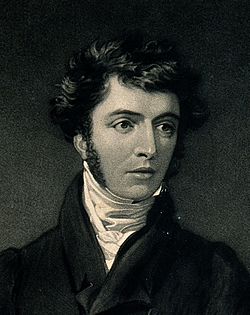Richard Dugard Grainger facts for kids
Richard Dugard Grainger (born in 1801, died February 1, 1865) was an important English doctor. He worked as a surgeon, which means he performed operations. He was also an anatomist, someone who studies the body's structure, and a physiologist, who studies how the body works.
Richard Grainger was born in Birmingham, a city in England. His father was also a surgeon. Richard went to a grammar school for his education. He had a brother named Edward Grainger, who also taught anatomy. After Edward, Richard took over and ran a private anatomy school called Webb Street for twenty years. Later, from 1842 to 1860, he became a lecturer at St Thomas's Hospital, teaching students about the human body.
Contents
Grainger's Medical Career
Richard Grainger became a Fellow of the Royal College of Surgeons of England. This is a special honor for surgeons. In 1848, he gave a famous speech called the Hunterian oration at the College.
Helping Society as an Inspector
Grainger also worked to improve public health and safety. He was an inspector for several important groups:
- In 1841, he worked with the Children's Employment Commission. This group looked into how children were working and tried to make things safer for them.
- In 1849, he was an inspector for the Board of Health. This board focused on keeping people healthy.
- In 1850, he wrote a report about cholera, a serious disease.
- He also worked as an inspector under the Burials Act of 1853, which dealt with how people were buried.
His Contributions to Science
Richard Grainger was a talented writer too. He wrote a book called Elements of general anatomy in 1829, which taught about the basics of the human body. In 1837, he wrote Observations on... the spinal cord, focusing on the spinal cord.
In January 1846, he was chosen to be a Fellow of the Royal Society. This is a very high honor for scientists in the UK. He earned this for his important work on the spinal cord. His research helped support the ideas of another scientist, Marshall Hall, about how our bodies react automatically to things, like pulling your hand away from something hot. This is called a reflex.
A Reformer and Philanthropist
People described Richard Grainger as a tall man who often stooped. He was not just a doctor but also a social reformer. This means he worked to make society better. He was also active in the Christian Medical Association, a group for doctors who shared his beliefs.
Grainger was a generous person. When people wanted to give him money as a sign of respect (a "testimonial"), he refused it. Instead, that money was used to create the Grainger prize, which likely helped other medical students or researchers.
 | Janet Taylor Pickett |
 | Synthia Saint James |
 | Howardena Pindell |
 | Faith Ringgold |


